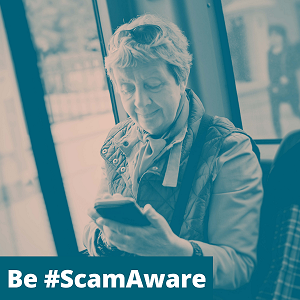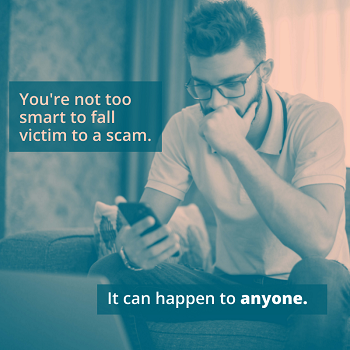We're all worried about money.
Don't let scammers take yours.

What is a scam?
A scam is a scheme to try to steal money, personal information or data from a person or organisation. Other names for a scam include fraud, hoax, con, swindle and cheat.
Scams can affect anyone, at any age, and happen online or in person. Lots of us are facing higher bills and worrying about money, and scammers are trying to take advantage of this.
We’ve seen a rise in scammers posing as traders, or selling through online marketplaces.
You should look out for scams such as:
- Traders who knock on your door, asking for upfront payments. You should take the time to ensure all traders are trustworthy before confirming work with them
- Cold callers or door-sellers offering deals. Take time to explore the options available to you
- False online adverts. It’s important that you take the time to check any claims are accurate before buying
- Emails or automated calls pretending to be from the government or an official company.
How can I spot a scam?
It’s important to always keep an eye out for scams. They can and do affect anyone. Below are some of the main warning signs of scams to look out for.
Something might be a scam if:
-
It seems too good to be true – like an email saying you’ve won a competition you don’t remember entering
-
Someone you don’t know contacts you unexpectedly
- You're being urged to respond or pay quickly
- You've been asked to pay for something urgently, or in an unusual way - for example by bank transfer or gift vouchers
- You’ve been asked to give away personal information
If you think someone might be trying to scam you, get advice. Contact the Citizens Advice consumer service on 0808 223 1133 for help with what to do next, and report scams or suspected scams to Action Fraud, the national reporting centre for fraud on 0300 123 2040.
You can check recent scams on Action Fraud’s website, and sign up for email alerts to find out about scams in your area at actionfraud.police.uk/news.
How can I protect myself?
If you’re not sure about something, get advice from a trusted source.
- Don’t rush into making any quick decisions. It's OK to take your time. If someone pressures you, it's probably a scam.
- Never give money or personal details, like passwords or bank details, to anyone you don’t know, trust or have only met online. Be wary of unexpected contact.
- Pay by debit or credit card. This gives you extra protection if things go wrong.
- Be suspicious. Scammers can be very smart. They can appear like a trusted business or government official, have a professional website and say all the right things. Take your time to work out if this is a real organisation. Ask them for ID or contact the organisation on an official phone number.
- Before you buy anything, check the company or website you’re using. Read reviews from different websites, search for the company’s details on Companies House, and take a look at their terms and conditions. Research any traders or companies before confirming any payments, particularly if they seem too good to be true.
- If you think someone might be trying to scam you, it’s important to act straight away.
What else can I do to stop online scams 

- Don’t click on or download anything you don’t trust
- Make sure your antivirus software is up to date
- Keep your online accounts secure:
- Use a strong password for email accounts that you don't use anywhere else.
- Some websites let you add a second step when you log in to your account. This is known as ‘2-factor authentication’. This makes it harder for scammers to access your accounts
There is more information on how to protect yourself from scams on the Citizens Advice website: citizensadvice.org.uk/scamsadvice
Friends Against Scams also have advice on how to protect yourself and your loved ones from scams: friendsagainstscams.org.uk
What can I do if I've been scammed?
If you’ve been scammed, there are 3 steps you need to take:
- Protect yourself from further risks
Don’t be embarrassed - contact your bank immediately to let them know what’s happened. You should also change any relevant log-in details, and check for viruses if you were scammed on a computer. - Check if you can get your money back
If you’ve lost money because of a scam, depending on the circumstances you might be able to get your money back by getting in touch directly with the method you used to pay. - Report the scam
Reporting scams protects others from being scammed:
-
- Call the Citizens Advice consumer service on 0808 223 1133
- Report the scam to Action Fraud. They’ll also give you a crime reference number, which can be helpful if you need to tell your bank you’ve been scammed.
It’s also important to talk about your experience with family and friends. By letting them know what’s happened they can be prepared, and together we can put a stop to scams.
In summary:
- Tell your bank straight away. They may be able to help you get your money back
- Protect yourself by changing your online passwords and checking your computer for viruses
- Report the scam.
How to get help and report scams
If you or someone you know has been scammed, you should:
Call the Citizens Advice consumer service if you need support: 0808 223 1133
Citizens Advice will report it to Trading Standards, and can offer further advice.
Report the scam to Action Fraud: 0300 123 2040
Sign up for Trading Standards scams alerts: FriendsAgainstScams.org.uk/Scam-Alert
Sign up for Action Fraud scams alerts: Actionfraud.police.uk
Below you can download a copy of our Be Scams Aware Leaflet, and we've also got an easy read scams guide.
Advice on scams
You can read all our scams advice here: citizensadvice.org.uk/ScamsAdvice, including how to:
○ Check if something might be a scam, which includes an online helper tool to help you work out if it could be a scam
○ Check if you can get your money back after a scam
○ What to do if you've been scammed
○ Report a scam
○ Get emotional support if you’ve been scammed
○ Get help with online scams.
○ Check if you can get your money back after a scam
○ What to do if you've been scammed
○ Report a scam
○ Get emotional support if you’ve been scammed
○ Get help with online scams.

First published: 10 June 2022. Last updated 19 May 2023.